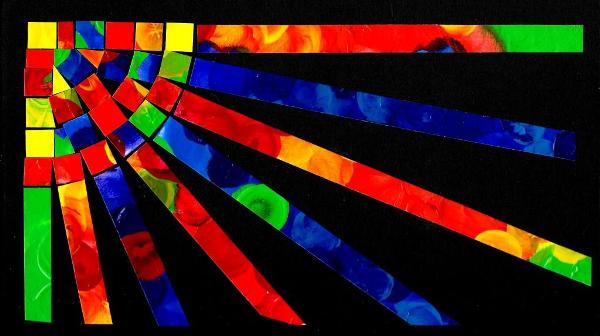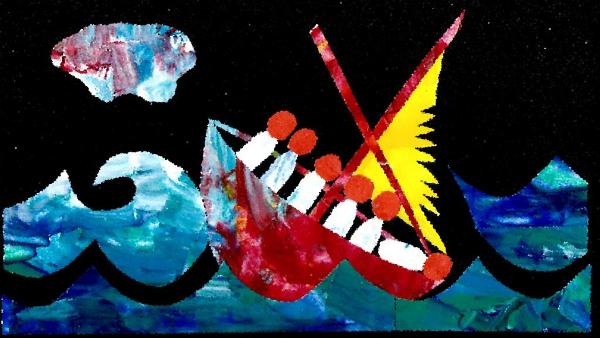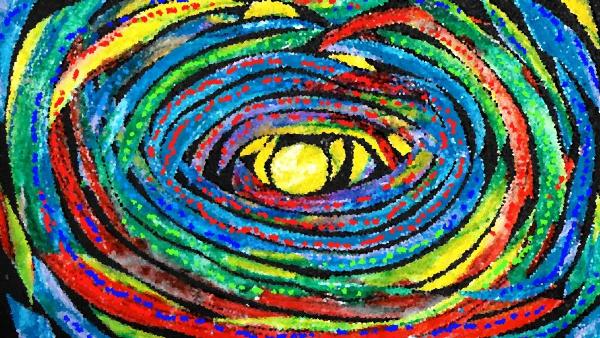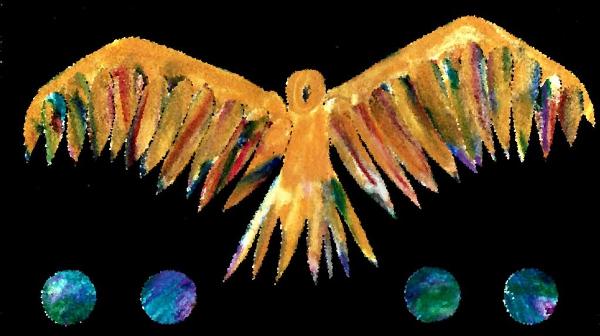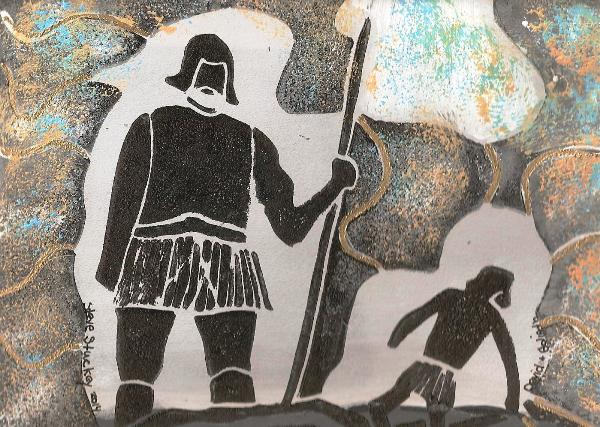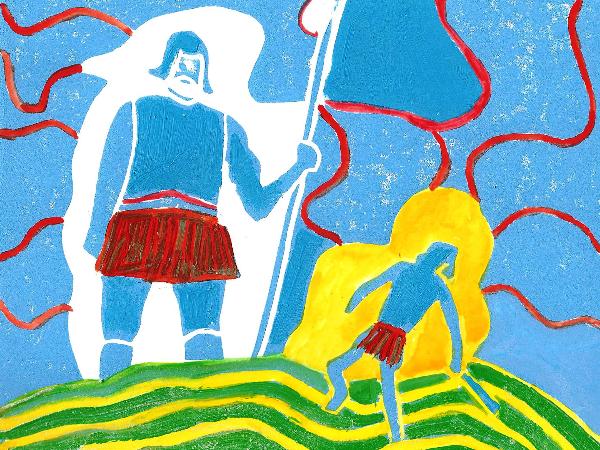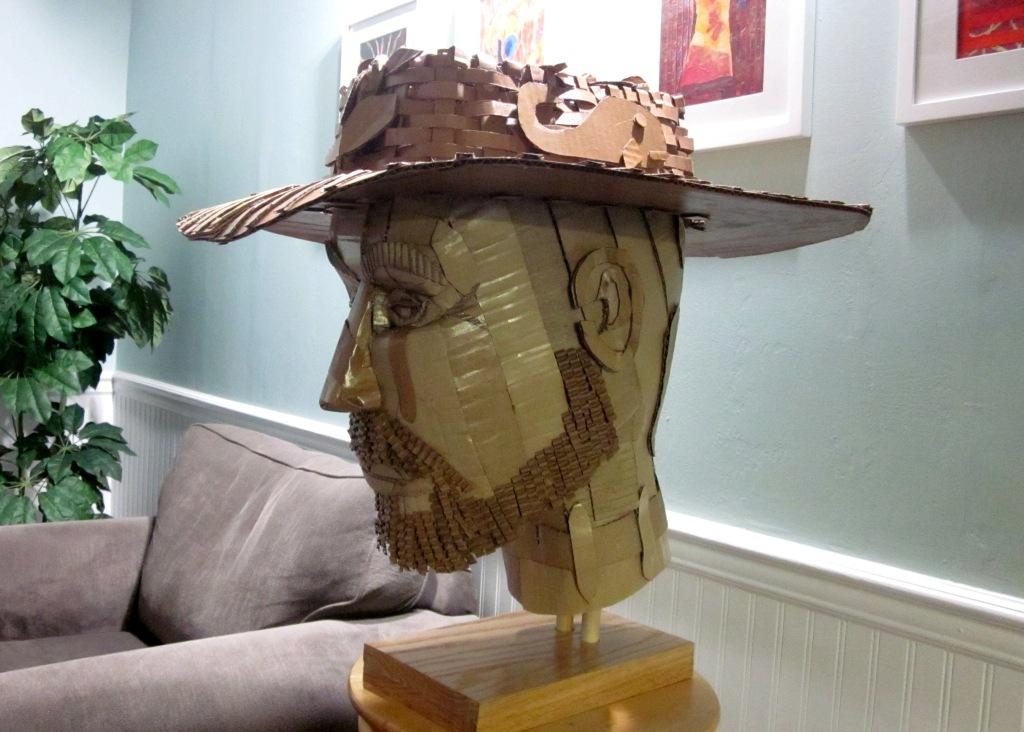 The story of Jonah has no tidy ending. The prophet sulks under his makeshift shelter while Yahweh’s question echoes across the ages, “Should I not be concerned for people who cannot tell their right hand from their left.” I pray the Lord will help not only his question, but also his compassion echo in my mind as well. May he give me courage to engage with him even when I know my logic and motivations are as misguided as Jonah’s. May he sort out my mind, heart, and will when it all feels like scrambled eggs to me. Amen
The story of Jonah has no tidy ending. The prophet sulks under his makeshift shelter while Yahweh’s question echoes across the ages, “Should I not be concerned for people who cannot tell their right hand from their left.” I pray the Lord will help not only his question, but also his compassion echo in my mind as well. May he give me courage to engage with him even when I know my logic and motivations are as misguided as Jonah’s. May he sort out my mind, heart, and will when it all feels like scrambled eggs to me. Amen
Category Archives: Biblical Studies
The Book of Jonah
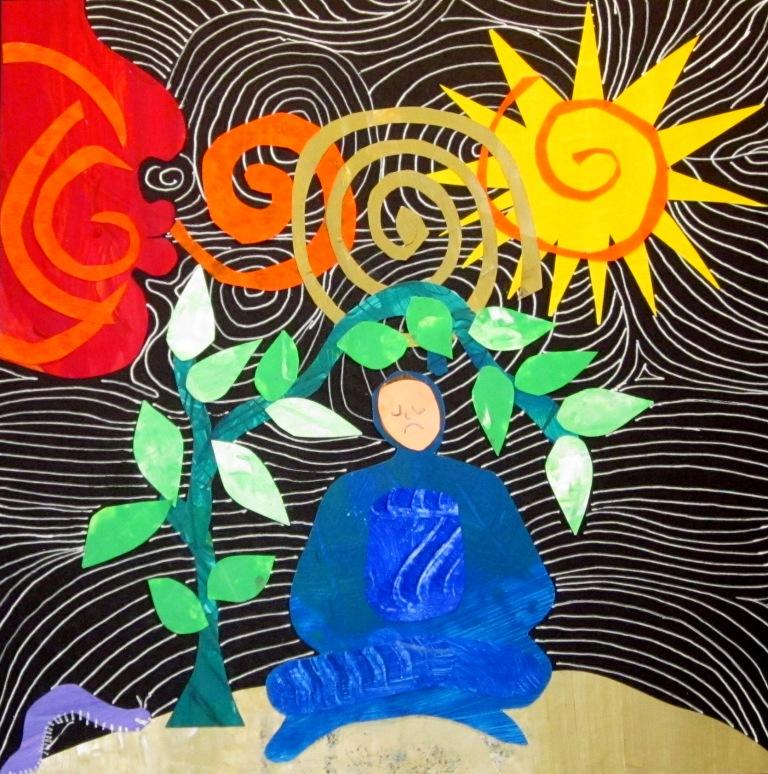
Parable of the Sew-er
One day a tailor named James went to his shop to sew. He gathered his needles and thread and laid them on the table. He then selected four pieces of cloth.
The first was a piece of thick black leather used in making jackets for bad-ass bikers who rode Harley Davidson motorcycles and screamed neo-Nazi slogans while roaring down the street. The needle broke in the tailor’s hand when he tried to stick it into the cloth. It was too hard.
The second piece of cloth was made of finely woven silk. The needle and thread passed through the cloth easily. But the silk was so thin that when the fibers got hot, they melted into a puddle of delusion. The only customers who bought the cloth were under-employed Hollywood starlets who thought they might benefit from a wardrobe malfunction when paparazzi flash bulbs started popping.
The third piece of cloth was a blend of fibers from the coffee bean and poison ivy plants. The needle and thread easily bound the fabric together. But after an hour, the customer would break out in a fit of hyperactive itching constantly checking their cell phones while scratching their armpits.
The fourth piece of cloth was made from one-thousand-thread-count Egyptian cotton. Needle and thread stitching seemed almost invisible. The tailor made a lovely cap that he wore to cover his bald head while singing songs in Central Park to nostalgic baby boomers worried about losing their social security benefits.
Whoever has ears to hear, let them hear!
For more information about the Parable of the Sower
Retreat Guides-Lessons from Mark #6-Parable of the Sower
Vincent Van Gogh and His Sower Paintings
Wind Talker
Introduction: Jesus had spent the day teaching and healing at the Sea of Galilee. Late in the afternoon, he said to his disciples in the boat with him, “Let’s go across to the other side of the lake.” He then proceeded to fall asleep in the back of the boat. Here is what I think happened next. (Ruah, by the way, is the Hebrew word for breath or wind. I have personified it here in the same way that we might call a storm Harvey or Irma.)
Wind Talker
From his perch on the mountain peak, Ruah looked out. Then he roared. His breath surged down the canyons and blew across the surface of the sea.
Trees fell. Dust flew. Wind howled.“Who dares cross me without asking my permission?” said He.
Seas swelled, waves crashed and seamen screamed, As their tiny boat was tossed like a cork in an angry caldron.
Some men prayed, others puked, still others pulled vainly on tattered ropes and sails.
All the while, one man slept. Unperturbed, unafraid, at ease in slumber while elemental forces raged all around Him.
“Who is it who sleeps?” said soaked sailors to one another. “Does he not care that Death shall swallow us whole?”
“Sleeper! Awake from your repose! Cry with us to the gods for mercy. Leave us not alone in the dead of night. Awake that we may perish together!”
Dream Maker opened his eyes to see twelve men whose hearts heaved with helpless fear, hopeless despair, angry anguish.
Looking skyward he said, “Lord of the Lake, what upsets you? It is I, do you not recognize me? We pass in peace. Calm down.
Then the winds ceased. The sea settled. All became quiet as the glow of dawn slowly appeared over the hills.
But twelve speechless men stood stunned. Faces white with fear and awe, knocking knees, trembling hands.
Who is it who talks to wicked winds and surging seas? Who is it who commands the breath of chaos, and it obeys? In his presence are we safe?
Who is safe with one who dangles death like keys on a chain? Who is safe with one who talks to the wind? Who is safe?
For more on this topic:
Put on New Shoes
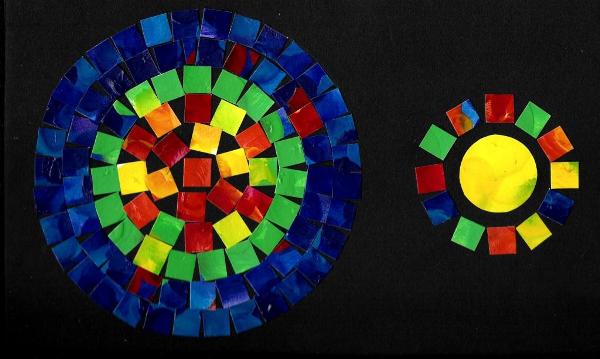 This poem is based on Mark 3:7-15 where Jesus invited a group of people to leave the crowd, go up the mountain, and become his followers. Carl Jung said that “we all walk in shoes too small for us.” I view the story from that lens. Jesus calls us to live a larger life. The painting above is titled The Crowd-The Twelve.
This poem is based on Mark 3:7-15 where Jesus invited a group of people to leave the crowd, go up the mountain, and become his followers. Carl Jung said that “we all walk in shoes too small for us.” I view the story from that lens. Jesus calls us to live a larger life. The painting above is titled The Crowd-The Twelve.
Put on New Shoes
Maladies of the mangled were made whole; frail and forlorn were healed. Word spread.
Then they came in droves wearing the perfume of desperation and death. Pushing and grabbing replaced civility and grace. Demons shrieked as Hell’s hold was wrecked.” Be silent, unholy ones! You have no place at my table.”
“I choose you instead,” said He. “Follow me to a place where the air is clear. Learn from me to see the un-seeable, the hidden, the disguised. Move beyond craving, clutching, and fussing. Be with Me.
Leave at lakeside your small life. Walk with me to a place higher up and deeper in. Put on new shoes and dream my dreams for you. Wrap your bones in a new name.
For more on this topic:
Still Point
It was dark outside. The first glimmers of dawn were hours away. The air was cool and still. The cloudless night sky was resplendent with stars that cast a silver hue over the land. The only sound was an occasional cough or snort of a sleeper stirring on their mat. His bare footsteps on the stone floor were as silent as a cat. He passed through the doorway like a ghost; the click of the lock imperceptible.
He glided over the darkened landscape heading away from the lake and up into the hills. Alone. Eventually, after walking for about thirty minutes, he came to a grassy knoll and sat down with his back against a rock. He sat listening to the silence for a while. Slowly, he sensed entering a safe space where he was loved. Then he sighed and as he exhaled, the disparate needs, the helplessness, the doubts and fears, the repressed anger, and the superficial adulations of those he had healed at Simon’s house the previous day were released from his body. He exhaled again and then when he inhaled he remembered Simon’s mother-in-law—a nameless old woman who lived in the shadows serving the household. When she was touched by him, she instinctively rose and quietly returned to her duties. Of all the people he had met the previous day, she was the one who intrigued him the most. She understood her purpose and place. So he sat with that thought for a long time.
Eventually, as the black sky turned a blue grey, he asked the silence, “What should I do next?” And a thought came to him, “You have your answer.” And so he did.
For more on this topic see
Beginnings
It was a portentous beginning for Jesus at the Jordan. The sacred river that once parted for Joshua anointed his namesake in baptism. The first Joshua was looking for a safe passageway to the promise land for his people. The stream was stopped to expose a muddy path. Danger and death were held at bay while the tribes marched by.
Jesus emerged from the waters to see the gates of heaven torn open. He heard a Voice proclaim love, kinship, and affirmation. That Voice would sustain him as he sought to conquer the death and danger that threatened to drown our sad world in sorrow. The Prince of Peace who was commissioned for service by Noah’s dove was driven to war with the devil by that same bird. And in that wild and lonely place, angels ministered to him as they will to us as we make space to receive them.
I am intrigued with how aware Jesus was of the invisible spiritual realities—sacred rituals that anchored him in history, the Father’s voice, a dove like anointing, and angels and devils in the wilderness. In our fast paced superficial world, we rarely take the time to listen, to notice, and to pray. We routinely fall prey to distraction while we miss the words of encouragement that might come to us through Scripture, friends, or our dreams.
For more on this topic:
Retreat Guide Lessons From Mark #1- Beginnings
Jacob-Poster Child for InterVarsity Staff
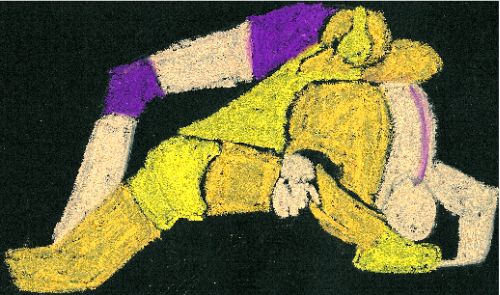 The story of Jacob has captivated my attention since 1993. Jacob was a man who tried to be someone other than who he was. He wanted to be his brother. Esau was loved by his father Isaac. Jacob was not. Esau was outgoing and popular with the ladies. Jacob was a quiet man of the tents. Esau, as the first born son, could expect a double portion of the family estate. Jacob could expect the leftovers. Esau was a blessed man and Jacob would do anything he could to grab that blessing for himself.
The story of Jacob has captivated my attention since 1993. Jacob was a man who tried to be someone other than who he was. He wanted to be his brother. Esau was loved by his father Isaac. Jacob was not. Esau was outgoing and popular with the ladies. Jacob was a quiet man of the tents. Esau, as the first born son, could expect a double portion of the family estate. Jacob could expect the leftovers. Esau was a blessed man and Jacob would do anything he could to grab that blessing for himself.
What I discovered in 1993 is that both of the brothers live inside me. Like Esau, I have been given just about every cultural advantage one could ask for. I am the first born son of a respectable majority culture family. I was given a good education at an elite university. I married a beautiful wife and we have been given three wonderful children and five grandchildren. We live in a lovely neighborhood and for our age and stage of life, we have decent health. I am a blessed man.
But if Esau is my external persona, Jacob is my internal one. I learned early on that if I wanted to avoid embarrassment or rejection and win the favor of others, I should do whatever I could to meet their expectations. I should become someone else. The strategy is a bit neurotic but what makes neurosis so attractive is that it works—for a while. By 1993 the strategy of winning favor through achievement and meeting expectations was wearing me out.
In his book Hustling God, Craig Barnes puts it this way:
Jacob’s name means “striver” or “hustler.” He had so much ambition that he could have been the poster child for the American Dream.
Jacob could also be the poster child for many who join InterVarsity staff. Each week I have conversations with friends who struggle with expectations from supervisors, parents, donors, and peers. Facebook has become the venue where people post their accomplishments. Those accomplishments become expectations that others in the social network feel they must live up to. Like the patriarch we strive for a blessing that we can never take, but only receive from the God who loves us.
Pray with me that the people I serve who have the sons of Rebekah wrestling inside of them too will be able to encounter the God of Jacob in deeper and more profound ways.
David and Goliath
The story of David and Goliath is one of the most iconic ones in all of Scripture and maybe all of history. The little guy with big faith in Yahweh defeated the much stronger pagan enemy. Michelangelo sculpted him as a 17 foot giant of faith. Management books use the story as an example for entrepreneurs. This story marks the beginning of David’s rise to fame and influence.What impressed me about David was his ability to reframe the view of the battle between Israel and the Philistines.
I did this block print twice. The one above is the one I have used on the study guide. The one below is more colorful.
What are These Sheep and Cows that I Hear?
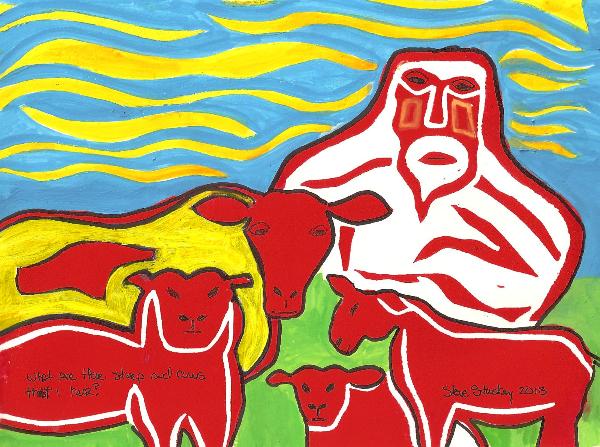
The Amalekites were a tribe of nomadic marauders who for centuries pillaged and plundered their way through history. Moses, Saul, David, and Hezekiah all did battle with them. Contemporary manifestations might be Al-Qaeda or the Congolese Rebels. They were bent on death and destruction and Yahweh finally send Saul and his army to reek destruction upon them. The command of genocide sounds disturbing to modern years and rightly so. Evidence from the story, however, suggests that the attack upon the Amalekites was a localized act of judgment. The tribe lived on to fight another day. The story, found in 1 Samuel 15, also reveals that the attack was a turning point in Saul’s reign as king and in his relationship with the Lord. Notice how he uses his success as a warrior to bolster his internal insecurities. This passage highlights the profound temptation that every successful leader faces. Samuel also says the famous line “To Obey is better than sacrifice.”
The linoleum block print depicts Samuel surrounded by sheep and a cow.

